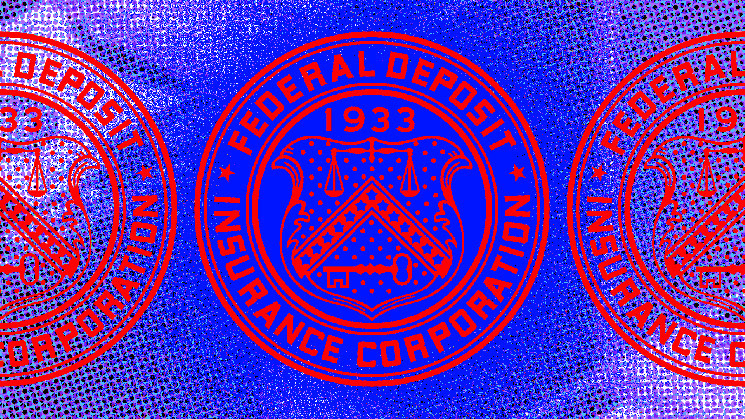
US Banks to join the crypto space race as regulators aim to stay relevant
- FDIC to offer “Clear Guidance” for banks to hold Bitcoin, stablecoins and crypto assets
- Federal Reserve, FDIC and the Office of the Comptroller of Currency collaborates on banking crypto policies
- Customers allowed to trade and keep Bitcoin, stable coins and other crypto assets on their balance sheets
- FDITECH, FDIC’s Tech Lab, is exploring innovative new tech via “crypto sprints” to evaluate and harden banking systems against disruptions
- China’s Bitcoin ban doesn’t affect Bitcoin, but hurts China
- El Salvador Legalizes Bitcoin as legal tender
- Miami aims to be Crypto Hub, pays city employees in Bitcoin and creates MiamiCoin, the first City Coin
FDIC Regulators Aim to Provide Clear Banking Guidance for Bitcoin Crypto Activities
FDIC Chairman Jelena McWilliams spoke at a Money 20/20 conference in Las Vegas on October 26, 2021, where she explained that she “wants to provide clear rules of the road – to allow innovation to flourish, while mitigating the risks.”
The Federal Reserve, the FDIC, and the Office of the Comptroller of Currency (OCC) have been working together to develop and coordinate policies for banks to adhere to when engaging with crypto assets.
McWilliams elaborated on the need to ensure that there’s appropriate accountability, focusing on stablecoins, which are cryptocurrencies that are pegged 1:1 to the US dollar.
More policy details are to come out soon in regards to how banks should:
- Handle holding Bitcoin to facilitate customer trading
- Use Bitcoin for collateral loans
- Hold Bitcoin on bank and customer balance sheets

FDIC Chairman Allows Banks into Crypto Space
“I think that we need to allow banks in this space, while appropriately managing and mitigating risk… If we don’t bring this activity inside the banks, it is going to develop outside of the banks…The federal regulators won’t be able to regulate it.”
FDIC Chairman, Jelena McWilliams | NASDAQ
Federal regulators realize that if they do not innovate, their legacy systems will be left in the dust, and they’ll for sure lose control over the US’s financial systems, and the people that use them.
Innovative crypto assets and blockchain’s distributed ledger technologies will developing outside the scope of government control if they don’t start to work with the digital transformation of money and the web3.0.
“Stablecoins also present certain risks, specifically if one or more were to become a dominant form of payment in the United States or globally. This could lead to substantial sums of money migrating out of insured banks with significant ramifications for credit creation, financial stability, and bank funding.”
FDIC Chairman, Jelena McWIlliams | Banking Journal
Federal Regulators Working on “Crypto Sprints” to Optimize Crypto Regulations
Bitcoin Magazine reports that in May, Fed vice chair of supervision, Randal Quarles stated that the agencies have been collaborating together on developing crypto regulation “sprints.”
FDITECH, The Federal Deposit Insurance Corporation’s Tech Lab, released a press release on October 25, 2021, stating that they’ve selected three teams to help banks “measure and test resiliency.”
The efforts of these sprints is to help the legacy banking industry explore innovative technologies. This includes aiding community banks and the banking industry withstand catastrophic disruptions.
Fiat currencies historically end up being destroyed, eventually dying out.
With historical printing taking place with the current Biden administration, and previous Trump administration, the US financial system is being tested.
Currently there’s talk of raising the debt ceiling even further, which can bring on further turmoil within the economy.
“Technology offers a tremendous opportunity to build a stronger, more resilient banking system. This sprint allowed our participants to design and explain some really innovative approaches to helping banks prepare for and respond to major disruptions of any kind.” – FDIC Chief Innovation Officer Sultan Meghji
FDIC Press Release, October 25, 2021
China’s Bitcoin Ban, Dumbest Geopolitical Move of the Century
China recently banned Bitcoin and all crypto transactions in an effort to have total control over the currency operating within their borders. Understandable as authoritarian governments have a tendency to control their citizens through money.
But can China really stop people from owning Bitcoin and other cryptocurrencies?
Probably not.
Bitcoin and the crypto space is evolving rapidly, and new money systems are being developed with the potential of being far more valuable than today’s internet. With that said, China’s move to ban Bitcoin and cryptocurrency in general is akin to shooting themselves in the foot.
The ban gives the advantage to countries that adopt and embrace the changes needed for society to adapt and progress.
El Salvador legalizes Bitcoin as legal tender, despite a few bumps
Countries like El Salvador have jumped onto the Bitcoin bandwagon, with President Nayib Bukele officially accepting Bitcoin as legal tender, giving citizens $30 USD worth in Bitcoin through the use of Chivo crypto wallets.
Although many are hesitant, and others unable to properly access the system. This is the beginning of using Bitcoin as a complimentary system while state financial systems fail their stress tests.
On another note, El Salvador is also makes waves with news of mining Bitcoin using volcano power.
Not bad for starters!
Will the US eventually follow suit in some manner, and if so, how?
With news of the US government embracing the crypto space, some mayors are discussing plans to invest in bitcoin as a way to eventually eliminate their citizens from having to pay taxes.
Francis Suarez, mayor of Miami made a Twitter announcement on Feb 11, 2021, discussing his plan to allow city employees to be paid in Bitcoin, pay taxes in Bitcoin and more.
Exploring:
— Mayor Francis Suarez (@FrancisSuarez) February 12, 2021
• State legislative priority
• Paying employees in Bitcoin
• Investing City treasury in Bitcoin
We got it done ✅ pic.twitter.com/88laGvVbEG
Suarez also made a case to mine Bitcoin using cheap nuclear power as part of a plan to make Miami a crypto and mining hub, as reported by Bitcoin Magazine.
Miami also launched MiamiCoin on August 3, 2021, which will allow people to buy and mine the CityCoin to fund infrastructure projects around Miami, and rewarding holders in Bitcoin per a report by Decrypt.
One thing is for sure.
Bitcoin is going mainstream.














